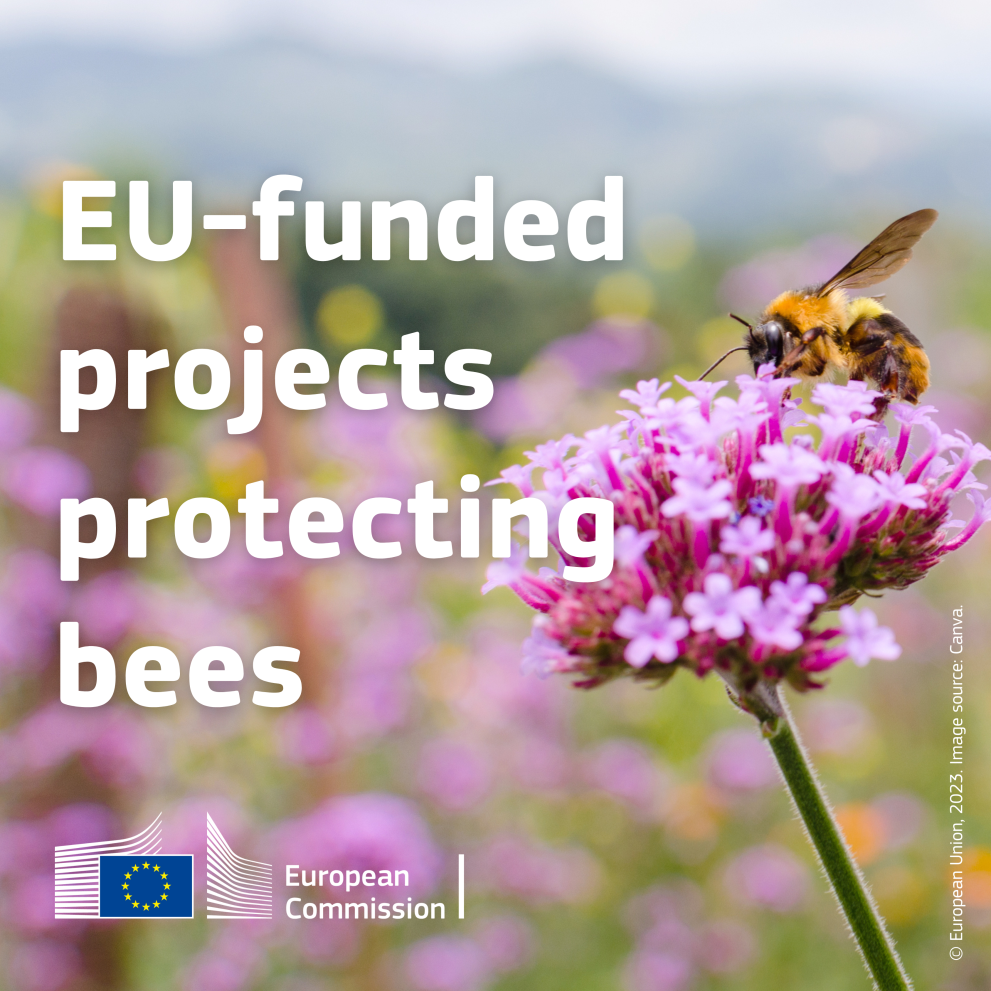
Did you know that one third of the exciting range of everyday foods we eat in Europe are pollinated by bees and other insects such as hoverflies, butterflies, moths, beetles, wasps, and thrips?
However, pollinators are increasingly under threat. A myriad of interacting and complex factors such as the loss of habitat and the use of pesticides combined with the effects of the climate crisis and pollution, account for the decline of pollinators. Some scientists also argue that this concoction of factors could be behind rising cases of Colony Collapse Disorder; where honey bees inexplicably abandon their hives, leaving behind the queen bee.
When it comes to bees, Europe has a duty of care as a higher proportion of threatened wild bee species are endemic to either Europe (20.4%, 400 species) or the EU 27 (14.6%, 277 species). This highlights the responsibility that European countries have to protect the global populations of these species. Almost 30% of all the species threatened (Critically Endangered, Endangered, or Vulnerable) at the European level are endemic to Europe (i.e., found nowhere else in the world).
In 2018, the European Commission adopted the first-ever EU initiative on wild pollinators. It set out strategic objectives, and actions for the EU and Member States to address the decline of pollinators. It has mobilised cross-sectoral action and made significant progress in pollinator monitoring. But clearly more needs to be done to fight the main drivers of their steep decline.
The Commission, through the Horizon 2020 and Horizon Europe funding programmes, is supporting bee and pollinator projects across the EU to help turn the tide. The following are just a sample of conservation efforts by projects managed by the European Research Executive Agency that highlight the importance of protecting biodiversity in line with EU Green Deal objectives.
Nourishing PRObiotics to Bees to Mitigate Stressors
Nosema ceranae is a bee gut parasite that causes bee colonies in Europe to collapse due to energy and nutrient deficiency. The banning of antibiotics for therapeutic use in the beekeeping sector has deprived beekeepers of Fumagillin-B, the sole antibiotic previously available to control Nosema ceranae. The need to find alternative treatments to fight bee diseases led researchers to the study of eco-friendly practices. The Nourishing PRObiotics to Bees to Mitigate Stressors project (NO-PROBLeMS) did exactly this and developed a strategy to inhibit the virus to protect bee gut health based on microbial and plant resources. NO PROBLeMs was developed by a consortium formed by 4 research institutions and 3 SMEs of 3 different European countries and a third country (Argentina).
Find out more about: NO PROBLeMS
Can artificial intelligence keep colonies safe?
The beehive device beekeepers rely on to manage bees and take care of their ongoing upkeep is a wooden box designed 150 years ago. This technology does not allow beekeepers to maintain healthy bees in the face of modern challenges like pests, diseases, and climate change. That is why with EU backing an Israeli company called Beewise developed the Beehome platform, which is a modular commercial AI-powered beehive composed of hardware and software that fully automates beekeeping while optimizing pollination and honey production. The technology is not exclusive to honeybees and can support various species of bees that face extinction across Europe.
Find out more about: Beewise
Pan-European Assessment, Monitoring, and Mitigation of Stressors on the Health of BEEs
Honey bees, bumble bees, and solitary bees face many threats in Europe, and one that has received increasing attention is the use of agrochemicals in industry. To what extent they may negatively impact bee health is the objective of the PoshBee project. PoshBee is a consortium of academics, governmental organisations, industry, and NGOs that seek to address the issue of agrochemicals to ensure the sustainable health of bees and their pollination services in Europe. The project intends to deliver practice- and policy-relevant research outputs to local, national, European, and global stakeholders. PoshBee’s work will support healthy bee populations, sustainable beekeeping, and sustainable pollination across Europe.
Find out more about: PoshBee
Giving Beekeeping Guidance by Computational-assisted Decision making
European beekeeping, the process of farming honey bees, can be prone to the spread of parasites and dangerous viruses to other local hives. In 2022 there is insufficient data on the socioeconomic consequences or sustainability of long-term beekeeping across Europe. The B-GOOD project paves the way towards healthy and sustainable beekeeping within the EU. The project aims to test and implement a common index for measuring and reporting honey bee health status (= Health Status Index, HSI), which will help risk assessors and authorities evaluate the effects of (beekeeping) management. B-GOOD will also assess the socio-economics of healthy and sustainable beekeeping, perform socio-economic analyses using qualitative and quantitative research methods, and identify viable and sustainable business models for European beekeeping. Their platform will integrate information available at the EU level, including information on farming, environment and socio-economics, providing relevant data for guiding decision making at local, regional and international scales.
Find out more about: B-GOOD
Food is culture
When travelling or in everyday life, people say that the best way to experience national culture is to try the local food. This is especially true in an organisation represented by 27 nationalities with so much to offer in terms of food variety, which this writer and self-confessing ‘bon vivant’ believes is the essential ‘buzz’ of life. Without bees and other pollinators, our food would be bland and boring. It is thus vital to continue to protect the humble and hard-working insects who pollinate the everyday fruits and vegetables that make our EU culture so historically delicious and tasty.
More information:
#EU Pollinators: small, precious and in need of protection!
Horizon magazine: Facing external threats, bees may get help
*This article was updated on 25 March 2024.
Details
- Publication date
- 17 May 2023
- Author
- European Research Executive Agency
